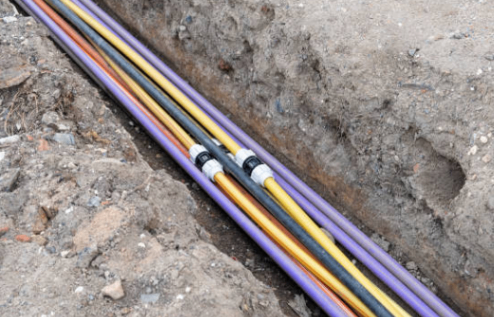Oufu Optical Fiber Cable Co.,Ltd
Address: Shenyang, Liaoning, China
Contact person: Manager Zhang
Phone: 400-964-1314
Mobile phone: +86 13904053308
【whatsapp && wechat】
2024-11-25 1728

In the digital age, the seamless transmission of data is paramount. Underground fiber cable, as a vital component of global telecommunications infrastructure, plays a crucial role in ensuring the reliability and speed of data transfer. This article will delve into the intricacies of underground fiber cable, highlighting its importance, benefits, and applications.
Keywords: Underground fiber cable, telecommunications, data transmission, fiber optic technology, infrastructure
Underground fiber cable consists of fiber optic strands enclosed within a protective casing, buried beneath the ground. These cables utilize light signals to transmit information over long distances with minimal loss of signal strength. Fiber optic cables are preferred over traditional copper cables due to their higher bandwidth, lower attenuation, and resistance to electromagnetic interference.
Durability and Reliability:
Underground fiber cables are shielded from external elements such as weather, animals, and human interference, providing a more stable and reliable transmission medium.
The protective casing and burial depth ensure that the cables are resilient to physical damage, reducing the risk of service disruptions.
Increased Bandwidth:
Fiber optic cables offer significantly higher bandwidth than copper cables, enabling the transmission of more data at faster speeds.
This is crucial for modern telecommunications, where high-speed internet, streaming media, and cloud services are becoming increasingly popular.
Electromagnetic Interference Resistance:
Unlike copper cables, fiber optic cables are immune to electromagnetic interference (EMI), ensuring clearer and more consistent signal transmission.
This is particularly important in areas with high levels of electromagnetic activity, such as urban centers or near power lines.
Telecommunications Networks:www.adsscable.cn
Underground fiber cables are the backbone of modern telecommunications networks, supporting voice, data, and video transmission.
They enable the provision of high-speed internet, telephone services, and television broadcasting to residential and commercial areas.
Data Centers and Cloud Services:
Data centers rely on underground fiber cables to connect servers, storage systems, and networking equipment.
These cables are essential for the provision of cloud services, ensuring that data can be accessed and transferred quickly and reliably.
Long-Distance Communications:
Underground fiber cables are used for long-distance communications, connecting cities, countries, and continents.
They play a critical role in global communication networks, enabling international calls, video conferencing, and data transfers.
Aesthetic Appeal:
Underground fiber cables eliminate the need for overhead wires, enhancing the aesthetic appeal of urban and suburban landscapes.
This contributes to a cleaner, more organized appearance and improves the overall quality of life in communities.
Safety:
By burying fiber cables underground, the risk of electric shock or fire hazards is minimized.www.adsscable.cn
Additionally, underground cables are less susceptible to tampering or vandalism, ensuring the integrity and security of telecommunications infrastructure.
Weather Resistance:
Underground fiber cables are less affected by extreme weather conditions such as storms, snow, and ice.www.adsscable.cn
This ensures that telecommunications services remain uninterrupted, even in adverse weather conditions.
Underground fiber cable is a cornerstone of modern telecommunications infrastructure. Its durability, reliability, and high bandwidth make it an ideal choice for transmitting data over long distances. From telecommunications networks to data centers and cloud services, underground fiber cables play a vital role in ensuring the seamless and efficient transmission of information. As the demand for high-speed internet and cloud services continues to grow, the importance of underground fiber cable will undoubtedly increase. By investing in this critical infrastructure, we can ensure that our telecommunications needs are met now and in the future.